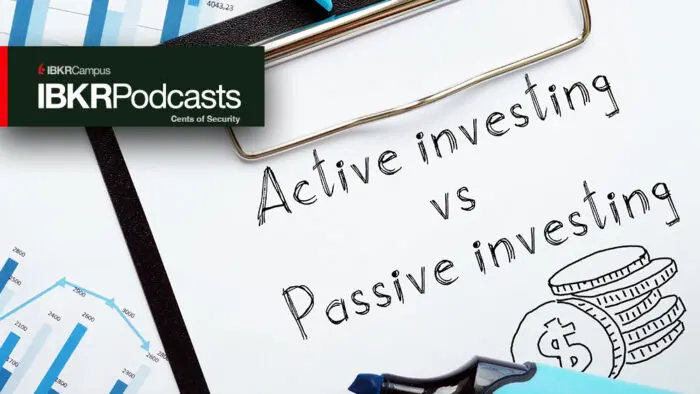In today’s world it is quite easy to get things delivered or a task completed from an app or website. But what is behind that whole system? Is that line of work something worth getting into? In this podcast we cover employment in the gig economy and the pros and cons associated. Brooke Coby, IBKR’s Global Head of Talent, joins Cassidy Clement, Senior Manager of SEO and Content to discuss.
Summary – Cents of Security Podcasts Ep. 32
The following is a summary of a live audio recording and may contain errors in spelling or grammar. Although IBKR has edited for clarity no material changes have been made.
Cassidy Clement
Welcome back to the Cents of Security Podcast. I’m Cassidy Clement, Senior Manager of SEO and Content at Interactive Brokers. Today I’m your host for our podcast and our guest is Brooke Coby, IBKR’s Global Head of Talent.
In today’s world, it’s quite easy to get things delivered or a task completed from an app or a website. But what is behind the whole system? Is that line of work something worth getting into? Today we’re going to cover employment in the gig economy and the pros and cons associated. Welcome to the program, Brooke.
Brooke Coby
Thanks, Cassidy. Great to be here.
Cassidy Clement
So what exactly is your background in the industry? How did you get into recruiting?
Brooke Coby
I have worked in some version of HR or recruiting or talent for the last twenty years, always in financial services. I worked at a number of banks and most recently as an Asset Manager and I’m actually pretty new to IBKR, so really excited to be here.
But I found right out of school- I got a job through an analyst program at an insurance firm actually. And I was always drawn to people, you know. They wanted to know how we are training new employees, how we’re hiring new employees, and fundamentally, I’ve learned over the last few years, if you want to be part of helping a really great business grow and get better, one of the best ways you can do that is through people. And I’ve always just loved working on the people side. Bringing in great people to make a difference at companies. I’m here, it’s great and I’m excited to talk to you about the gig economy today.
Cassidy Clement
Awesome. So I know we’re going to cover a little bit more, deeper as we go through the questions, but what exactly is the gig economy? How are people paid? Because I know people will say in the back of their minds, oh, there’s a freelance job or a contract job, or maybe I’m going to supplement my income by delivering some Grubhub food. What exactly is all that? How are they paid?
Brooke Coby
Yeah, it’s interesting. I feel like the term gig economy sort of came out a couple of years ago and it was enabled sort of by this tech boom that people had access to doing multiple part time jobs or working as a contractor. But if you think about it, it’s always been an option that you could do part time work or a few little jobs.
So if you think about it like that, that’s sort of how I would position it. But actually in the last few years we’ve seen kind of a boom in the gig economy. So like you and I probably took an Uber this weekend. That feels like a normal thing. I ordered a piece of furniture off of IKEA and I went to taskrabbit.com and somebody came and they had this skill as a carpenter. And they were working for a few different sites and things like that. My sister just left her corporate job, and she’s got great skills as a brand partner, an ad salesperson, and she’s now figuring out what she’s going to do next. But she’s working for a few different clients.
I think one of the most interesting things on the early career side is if you didn’t know what you wanted to do, right, and you wanted to develop a few different skills, you could try a few things out, right? Like you could get a few jobs as a contractor, as a consultant or you could go in for a six-month project and test it out. So I would say that on the early career side for young people leaving high school or leaving college is super interesting. You’re starting to see a lot of a lot of young people do that, but actually the thing that I think is really interesting that’s emerging is older Americans.
As people are, you know, we have a massive retirement crisis in this country. As people are planning their retirement, or maybe they’ve retired and they want to supplement their income or they want to just keep up their skills and keep active, you’re starting to see retirees or close to retirees doing that. So I think I told you about my sisters, my dad retired or semi-retired a few years ago and he wanted to stay active, but he wanted to supplement his income and he’s doing project work, which is a form of the the gig economy. And it’s one of those things because I remember I graduated from college and it sort of seemed like a straight line, right? Like how do I get a job? How do I get benefits? How much money do I absolutely need to make to live in New York City? And I didn’t think about it in that creative way, but I think young Americans now really are seeing it and it’s a really interesting option.
Cassidy Clement
You had mentioned a few things. Some people, they immediately think of, at least more of the millennial Gen. Z crowd, you immediately think of the apps and the websites that are very “click to get immediate satisfaction” or very quickly getting what you need filled.
But as you mentioned with the gig economy, some people are taking skills that they have and doing maybe part time or freelance options. And then there’s other people who are taking hobbies that they have, that they’re good at. Maybe they were a super good carpenter, but they were working in a bank most of their life. So now they help out with that supplemental thing. So are there well-known companies in this space that most people would be like I heard that’s gig economy. I’m aware of it.
Brooke Coby
Yeah. And I think Task Rabbit, you know, certainly any of the.. Listen, technology has enabled this because you can say yes or no pretty quickly. Whether it fits your schedule or it’s a job you want to do or it’s in 20 minutes or in two hours or you need to supplement your income. So you can say yes. So I think the examples of like Uber and Lyft. And some of the grocery delivery applications and things like that.
I think locally, as an example, we have some apps that support childcare, we have some apps that support tutoring, things like that. So people will sort of retain a relationship with a company that says, like I have this skill, I’m a math tutor and the jobs will get posted and they can say yes when they want to say yes and they can not participate when they’re not looking for the extra work.
Cassidy Clement
When we’re talking about some of this app-type employment, how exactly would that differ from, let’s say, a freelance or a contracted job?
Brooke Coby
There are a few different versions of this right, like so you can be a contractor with a firm and you have a relationship with them. You’ve signed a contract, you’ve agreed on the terms and conditions, how much you’re going to get paid, how long the assignment is. Or you could just be, effectively, someone who’s in the database of workers. You’ve gone through whatever qualifications you need to, or screening that they can sort of come to you on demand.
So I think there are a few different setups, each of them sort of a little bit more flexible than not. And by the way, I think that’s an interesting point in this, like the flexibility piece. So as you said, not all gig jobs are the same, right? So you have sort of like the most, I guess what traditional people would think of gig, which is like you’re generally in their database. You can say you want the job or not, but they’re not depending on you to come and work. And then you have these contractor setups where actually you say, you know, I work in recruiting, there are many recruiters who work on a contract basis, right? Like they’ll say, I want to and that and that has a real benefit, right? You could do that for six months, you learn a new company, you learn a new industry, you get sort of six months and you say actually I want to be a recruiter in a healthcare firm and you switch firms. It’s a nice sort of quantifiable skill that you can be quite mobile with. So that is like awesome flexibility. The range of those things. But you know there’s a downside to all of this, especially, you know, if your savings isn’t very robust or you have a life set up that you’re really trying to take care of people or you want your healthcare benefits.
So the benefit side of things. When you’re in the gig economy, you don’t get benefits. You’re not a full-time employee of a company. And I say that on the healthcare side, right? Like being a full-time employee. Most companies will offer access to health and dental, but there’s also the retirement planning and the investment planning, which as research tells us, is that as an investor and as a saver, if you’re rolled in a retirement plan scheme, you’re sort of more likely to accumulate savings.
So if you’re in the gig economy and you’re doing part time work or you’re just accepting gigs, you don’t have access to those health benefits. Most likely you don’t have access to a retirement plan that’s helping you to achieve savings and you also from a tax perspective are quite different, right? Like you’re treated quite different so. You and I both work for Interactive Brokers. We filed our W2s. We’re planning for our taxes. We’re not going to get hit a totally unexpected tax bill come tax season. If you’re a gig worker or if you’re a contractor, you need to plan for that. And I think that’s a big skill that you need to learn and adjust to if you’re working in these types of jobs.
Cassidy Clement
So you had mentioned a few items of this is great, this is not great, pros and cons. But otherwise, are there any other things when it comes to I guess we can say on a person-by-person basis or maybe like worker-by-worker basis, meaning maybe some cultural things or aspects that you would not get? Or, you know, the variety, as you mentioned, of tasks and the independence. Are there any other pros and cons that aren’t necessarily monetary or tax wise that people wouldn’t think of out the gate?
Brooke Coby
Completely. I think and I believe this so much. One of the reasons I work in talent is I think happiness at work like feeling like you’re doing something with purpose and that you’re learning and you have a community of colleagues and maybe a great manager or some mentors is really important to your overall happiness. And I think there’s a sense of if you’re doing temporary work or if you’re jumping from gig to gig, while you have amazing flexibility, you’re not part of that community, that firm-wide culture that I think actually, you can quantify monetarily. But it’s also part of just generally the community you’re in. I think there’s also a sense of I talked about this idea that the gig economy sort of enables people to develop skills, right? To go from gig to gig or to work part time and go deep in something, but as a full-time employee, very often companies may have a training program, right? They may more than likely would have a manager that was a little more long term, right? Who could teach you. You’d be sitting amongst colleagues and not to say that you can’t do that in the gig economy. But there’s a little bit more permanence to it that I think there’s some training and cultural aspects that are quite important.
Cassidy Clement
Yeah. And as you mentioned kind of with the, we’ll say mentorship or we could say sought after path when it comes to a little bit more of a long-term employment scenario. Sometimes the employer is looking to invest in the talent. That way they can retain you. You can have a mentorship potential when you find some niche that you’re interested in to see if somebody could help guide you. But another thing that I think people may forget about when it comes to gig economy type work is when you have to use it towards your overall income.
Let’s say that is what you do for a living, usually in full time employment, kind of know what’s coming down the pipeline. You’re kind of like, okay, this is what I do. This is my general day today. When you’re in this gig economy scenario, you have to be incredibly planned out because you have to be ready to find the next gig when the contract is up or let’s say the task is completed and that’s a big caveat. Because as you said with maybe, let’s say an Uber, Lyft, etc, you’re in their database, you’re able to accept or deny potential employment or tasks or potential ways to make money where when you’re looking for a contract or freelance work, usually you have to interview. Go through the process. It takes a little bit longer and you have to be able to say, okay, if this is only three months long, what am I going to do for the next nine months of the year for my income?
Brooke Coby
Right. What next? Everybody’s different. I think a lot of people would find that quite stressful, right? Either financially or just that you’re always having to think what’s next. And the other thing I would add to that is I think the gig economy has been quite good for companies, right, like think about like I know Amazon has a program. Lots of firms where their business peaks right? Like it’s a particularly busy season or they just need more workers. That comes with risk, right? Like if there’s a challenging market or an economical turn, you are less, I think protected than full-time employees where a company sort of staffs generally like for their full time staff, they think about who do we generally need to do the work that our business needs? And many companies actually use that model, right? Where they’ll have a certain number of full time employees that they have as their general level and they’ll spike up when they have big time. So again, it depends on your sort of psychology and your appetite for risk, right? Because we talked about lots of those benefits. But if you’re a salaried worker and a full-time worker, you know consistently what’s happening. And I think you are as a gig economy temporary worker, a little bit more at risk during more challenging times.
Cassidy Clement
We mentioned kind of the comparing and contrasting of the full-time employment versus the part time or gig economy. What are some questions that maybe someone should ask themselves before getting into a gig economy job? Whether it’s for supplemental income or if they would like to turn it into kind of their full time? If you will.
Brooke Coby
Listen, I think anytime anyone’s going into any sort of job, you have to think about what am I good at? What’s going to make me really happy? What’s going to pay the bills or fill my time in a way that I’m comfortable with, right? Like these are pros and cons. So, are you looking for longevity in a career? Are you looking to try something out? And we’ve talked about this in sort of a proactive way. So, there are certain parts of, the American workforce that don’t have the choice of doing a full-time job, right?
So I think a lot of it is what’s my lifestyle, what are the economic choices that are important for me to make? And then what’s my comfort with risk, right? Do I see the upside of that variety of work, that access to more work when I need it and less work when I don’t need it? Is that like a total game changer for my life? Or am I someone that wants benefits, wants a 401K, wants a great manager, wants to start building friends and colleagues and mentors at my job and sort of having a more steady plane.
And I think people who are comfortable with that risk, in a situation I was sort of mentioning, not everybody has a choice. Potentially they can only work part time right? Like it works best for their life to only work two months of the year, you know, points of, you know, sort of like sprints of work, that suits them better. Or they’re at an age, whether it’s an early age or a more later-stage career where they don’t want to work 40 hours a week. They want to do work on-demand or in certain sprints.
Cassidy Clement
You’re totally right in the sense of sometimes people forget that it’s both sides in the number line here. You’re going to have people entering who may be 16, 17, just got their license who are like, I need some extra cash because I can’t work during hours I’m in school. So they may go out and help deliver food for Uber Eats. And at the same time you might have somebody who says, hey, I was really good at being a seamstress. But I did this for 40 years as my main career and now I am going to. Come prom. Everybody’s looking for a tailor. They’re going to be doing great gigs. So there’s always a spectrum to this. I know I have many friends and family who have done things as supplemental for, like, they got a big purchase coming up. I’ve got to pick up extra work, right? A house, car, kids, going to college, etcetera. But these were all really great points. This was a great conversation. Thanks for joining us.
Brooke Coby
Thanks for having me.
Cassidy Clement
Yes. So as always, listeners can learn more about an array of financial topics for free at ibkrcampus.com. Follow us on your favorite podcast network and feel free to leave us a rating or review. Thanks for listening.
Disclosure: Interactive Brokers
The analysis in this material is provided for information only and is not and should not be construed as an offer to sell or the solicitation of an offer to buy any security. To the extent that this material discusses general market activity, industry or sector trends or other broad-based economic or political conditions, it should not be construed as research or investment advice. To the extent that it includes references to specific securities, commodities, currencies, or other instruments, those references do not constitute a recommendation by IBKR to buy, sell or hold such investments. This material does not and is not intended to take into account the particular financial conditions, investment objectives or requirements of individual customers. Before acting on this material, you should consider whether it is suitable for your particular circumstances and, as necessary, seek professional advice.
The views and opinions expressed herein are those of the author and do not necessarily reflect the views of Interactive Brokers, its affiliates, or its employees.



















Join The Conversation
If you have a general question, it may already be covered in our FAQs. If you have an account-specific question or concern, please reach out to Client Services.